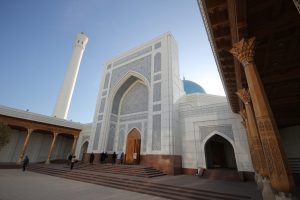The U.S. Commission on International Religious Freedom (USCIRF) once again has recommended that the U.S. State Department designate Tajikistan and Turkmenistan as “countries of particular concern” (CPCs) for being among the world’s worst violators of religious freedom. In addition, the report also recommends Kazakhstan and Uzbekistan be listed on the “special watch list” for “engaging in or tolerating severe violations of religious freedom.”
The annual report recommends that the U.S. State Department re-designate 12 countries currently labeled as CPCs (China, Cuba, Eritrea, Iran, Myanmar, Nicaragua, North Korea, Pakistan, Russia, Saudi Arabia, Tajikistan, and Turkmenistan), and designate five additional countries (Afghanistan, India, Nigeria, Syria, and Vietnam.)
The religious freedoms of people in Central Asia are violated in routine ways. In Tajikistan, children under 18 are barred from attending mosque and those under 35 are barred from making the hajj pilgrimage. Last August an Ismaili Muslim cleric, Muzaffar Davlatmirov, was given a five-year sentence on “extremism” charges after he officiated funeral services for protesters killed by the government in the Gorno-Badakhshan Autonomous Region (GBAO). Across Central Asia, religious groups are subject to onerous registration requirements. And although conditions have improved slightly in Uzbekistan since the 2016 death of Islam Karimov, USCIRF notes that the Uzbek government continues to “severely restrict freedom of religion or belief” via religious legislation mandating registration and banning missionary activity.
USCIRF is an independent, bipartisan federal body that monitors the status of freedom of religion abroad in order to make policy recommendations to the president, secretary of state, and Congress. Each year, USCIRF releases an annual report making recommendations. Later in the year, the U.S. State Department makes its determination on which countries to list as CPCs, which to include on the special watch list, and which countries to request waivers from sanctions for.
As I’ve covered in the past, although the 1998 International Religious Freedom Act (IRFA) provides a menu of punitive sanctions options it also provides for an administration to eschew any sanctions by requesting a waiver.
Tajikistan has been designated as a CPC since 2016 and Turkmenistan since 2014. Uzbekistan had been designated as a CPC from 2006 to 2018 when it was removed by the U.S. State Department and placed on the special watch list, from which it was removed in 2020. USCIRF recommended a CPC designation for Uzbekistan until 2020 and has continued to recommend its inclusion on the special watch list in the years since. Kazakhstan has also been recommended for the special watch list for a few years but never designated so by the U.S. State Department.
Tajikistan, Turkmenistan, and Uzbekistan have always been granted waivers from sanctions — “as required in the important national interest of the United States” — even when designated as CPCs, and never suffered any of the consequences outlined by the IRFA.
In the key findings of the 2023 annual report, USCIRF remarks, “USCIRF has long called on administrations to refrain from issuing waivers and relying exclusively on existing sanctions to hold CPCs accountable.” One of its recommendations to the Biden administration is to review U.S. policy toward Pakistan, Saudi Arabia, Tajikistan, and Turkmenistan — the four countries designated as CPCs in 2022 but granted waivers — “to make policy changes for meaningful consequences and encourage positive change.”

































